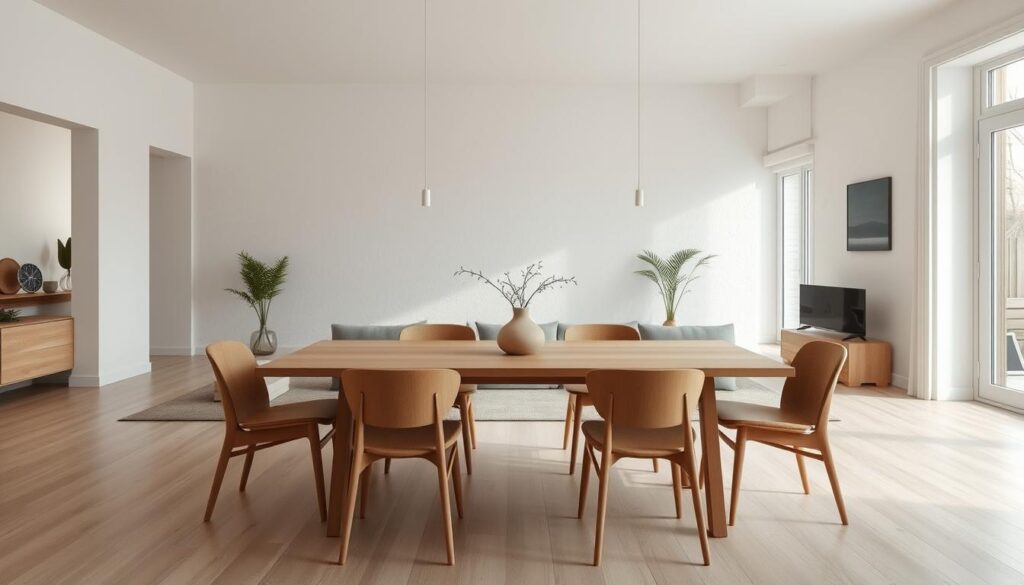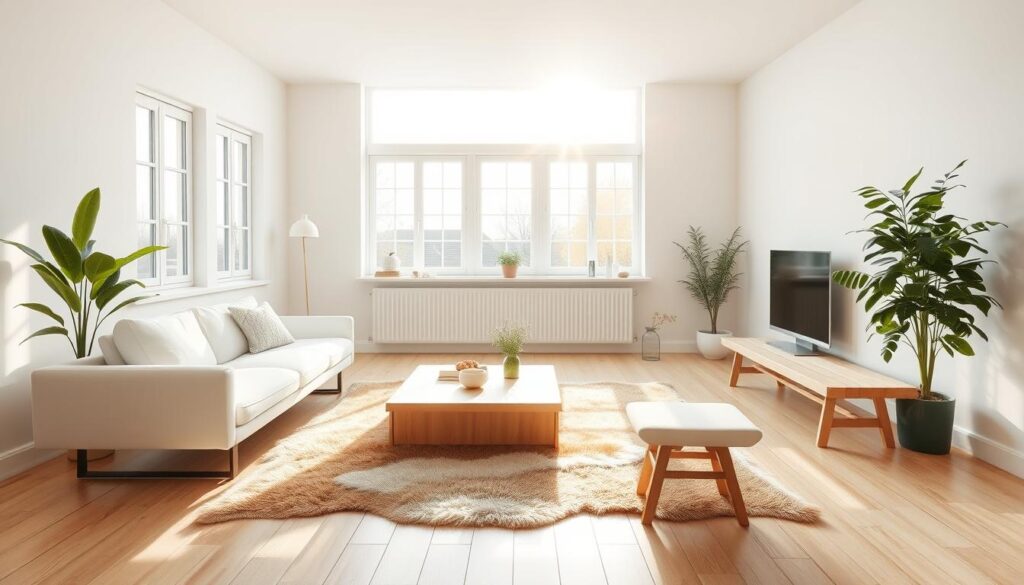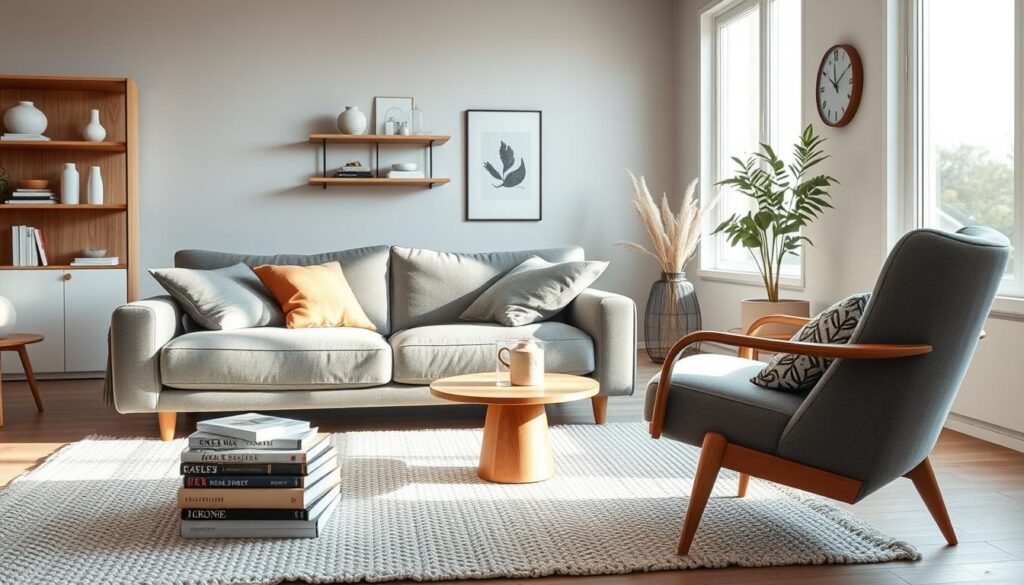Last winter, I spent hours staring at my cluttered living room. Piles of mismatched throw pillows and bulky furniture made the space feel heavy. Then I stumbled across a photo of a sunlit Nordic living room—airy, inviting, and intentionally simple. That moment sparked my love affair with a design philosophy that balances beauty and practicality.
This aesthetic isn’t just about looking pretty. It’s rooted in the 1930s, when Nordic designers like Alvar Aalto reimagined how homes could function. Harsh winters demanded spaces that felt warm yet uncluttered. Think clean lines, natural textures, and a focus on light. As interior designer Lindye Galloway says, “It’s not overdone—it’s intentional.”
By the 1950s, America caught the bug. The Brooklyn Museum’s 1954 “Design in Scandinavia” exhibit introduced U.S. homeowners to this fresh approach. Today, it’s everywhere—from minimalist apartments to cozy family rooms. Why? Because it works. The blend of midcentury shapes and modern comfort creates rooms that breathe.
Over the next few sections, I’ll break down how to bring this magic into your space. We’ll explore its history, key principles, and why it remains a go-to style for creating welcoming homes. Ready to turn chaos into calm? Let’s begin.
Embracing Minimalism and Functional Design
My journey into minimalist living began with a single empty shelf that changed my perspective. That blank space became my daily reminder that beauty lives in what we choose to keep, not what we accumulate. This philosophy lies at the heart of Scandinavian design, where every item earns its place through purpose and presence.

Simplifying Your Space for Serenity
I learned to edit rooms like sentences—removing excess until only essential “words” remain. Start by asking: “Does this object spark joy and serve a need?” Author Niki Brantmark’s concept of lagom teaches us to find the “just right” balance. Replace bulky furniture with streamlined pieces that let walls breathe. Use woven baskets for hidden storage that still feels intentional.
Balancing Form and Function
Your coffee table shouldn’t just hold coasters—it could double as a storage trunk. That pendant light? It’s both art and illumination. Scandinavian interior design thrives on this dual purpose approach. Choose a sofa with clean lines and deep cushions. Opt for floating shelves that display plants while saving floor space. Remember: functional doesn’t mean boring—it means thoughtful.
This design style proves minimalism isn’t about deprivation. It’s about creating rooms that work with you, not against you. When every item has meaning, your space becomes a sanctuary rather than a storage unit.
Essential Elements of Scandinavian Interior Design
I first grasped the power of thoughtful design while visiting a friend’s sun-drenched apartment. Every corner felt purposeful yet peaceful—like the room itself was exhaling. This balance defines Nordic-inspired spaces, where natural light and clean lines work together to create harmony.

Natural Light and Airy Ambience
Nordic winters taught designers to treat sunlight like liquid gold. Try these tricks I’ve used in my own home:
- Swap heavy drapes for sheer linen curtains that filter light without blocking it
- Place mirrors opposite windows to double your daylight
- Choose pale walls that act as light reflectors
Hardwood floors in light oak or ash make rooms feel brighter than wall-to-wall carpet. For authentic Scandinavian home decor ideas, leave windows bare when possible—privacy comes from strategic furniture placement rather than heavy fabrics.
Quality Craftsmanship and Clean Lines
My favorite armchair proves good design lasts decades. Look for:
- Furniture joints that show skilled woodworking
- Textiles like undyed wool that improve with age
- Minimal hardware—think hidden hinges and recessed handles
This approach values natural materials over trendy finishes. A single well-made oak table adds more warmth than three cheap side tables. Remember: clean lines don’t mean cold spaces. Layer in sheepskin throws or a chunky knit rug to balance sleek silhouettes.
Scandinavian Decor: Must-Have Pieces for a Cozy Home
When I found my grandmother’s teak sideboard at a flea market, I finally understood how great design shapes a room. The right pieces don’t just fill space—they create moments. Let’s explore the essentials that bring Nordic-inspired warmth to modern homes.

Statement Furniture and Iconic Accessories
Start with effortless Scandinavian home decorating ideas by choosing furniture that works twice as hard. My modular sofa doubles as a guest bed, while a storage ottoman hides blankets. Look for clean-lined classics like Hans Wegner’s Wishbone Chair—its curved back feels like a hug for your dining area.
Accessories should whisper, not shout. A matte-black PH Artichoke Lamp becomes sculptural art when lit. Try these functional beauties:
- Hand-blown glass vases that catch afternoon light
- Concrete planters holding air-purifying snake plants
- Floating shelves displaying well-loved books
Don’t forget texture! I layer a sheepskin throw over my Arne Jacobsen Egg Chair—it’s like sitting in a cloud. For sleek storage solutions, try woven baskets under coffee tables. They keep remotes handy but hidden, proving organization can be beautiful.
Your living space deserves pieces that age gracefully. Choose oak side tables over particleboard, and wool rugs that soften footsteps. Remember: every item should tell part of your story while making daily life easier. That’s the magic of intentional interior design.
Incorporating Natural Light and Organic Materials
I discovered the magic of light during a rainy Seattle afternoon. My dim hallway transformed when I swapped dark drapes for airy linen—suddenly, the space felt alive. This experience taught me how natural light and organic textures work together to create rooms that soothe and inspire.
Maximizing Brightness with Light Tones
Start by treating walls as light amplifiers. Paint them in soft whites or pale grays—these hues act like sunlight reflectors. In my kitchen, I used eggshell-finish paint to bounce morning rays across countertops. For windows:
- Install sheer curtains that filter light without blocking it
- Position mirrors diagonally from windows to create depth
- Use glass furniture to maintain sightlines
Even small spaces glow when you layer light sources. Try a wooden pendant lamp paired with recessed lighting—it’s like sunlight at midnight.
Integrating Wood, Stone, and Textiles
Natural materials add warmth that synthetic finishes can’t match. My favorite trick? Mix textures. A rough-hewn oak table feels cozy next to smooth marble coasters. Try these combinations:
- Wool throws over leather armchairs
- Slate tile accents beside birch shelving
- Jute rugs under linen-upholstered stools
For earthy bedroom accents, layer sheepskin on stone-gray bedding. Remember: imperfections tell stories. A knotted wood bowl or cracked ceramic vase brings soul to sleek spaces. Let nature’s variations shine through.
Curating Clean Lines and Modern Furniture
My home office makeover taught me how intentional furnishings transform cluttered corners into calm workspaces. Nordic-inspired design thrives on this idea—every curve and angle serves a purpose while radiating quiet confidence.
Selecting Multi-Functional, Minimalist Pieces
Start with furniture that whispers “I belong here.” My desk doubles as a dining table—its slim oak legs and hidden drawers prove practicality can be beautiful. Look for:
- Sofas with built-in storage under seat cushions
- Nesting tables that tuck away when not needed
- Wall-mounted shelves displaying plants and books
For those seeking effortless elegance, choose armchairs with tapered legs and undyed linen upholstery. I paired mine with a vintage teak sideboard—its clean lines balance the room’s modern edge.
Remember: great design solves problems. A bench by your entryway stores shoes while offering seating. Floating nightstands keep bedrooms airy. Like the balance found in Japanese interiors, Scandinavian spaces thrive when every piece earns its place through beauty and brains.

qfrgdu